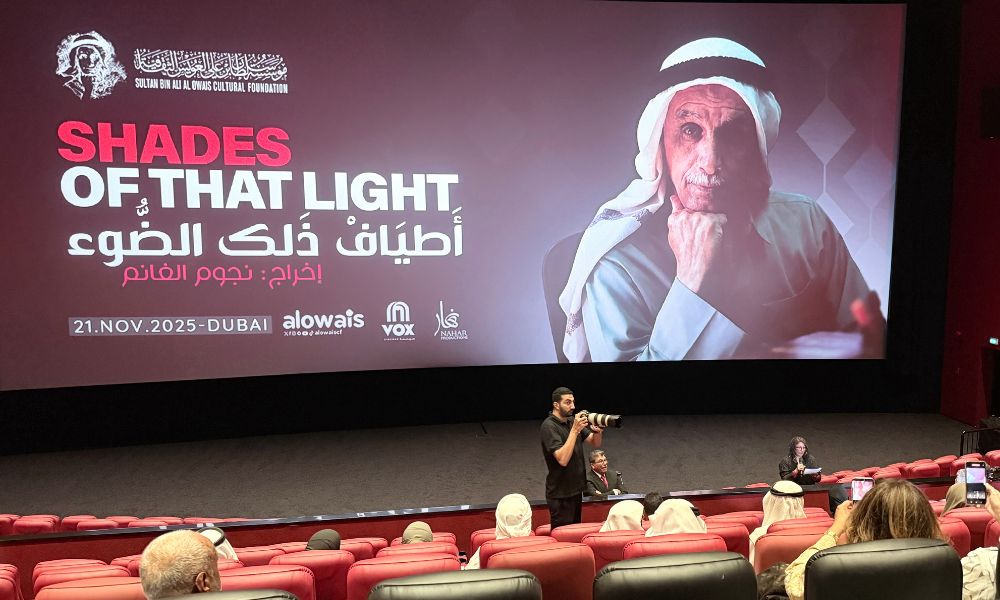Some films do not begin on the screen. They begin in the quiet space between you and your expectations. On Friday evening, 21st November, 2025; I walked into the premiere of Shades of That Light at VOX Cinema in Wafi Mall in Dubai, with no idea what I was about to encounter. I did not know the story, the arc, or the man behind the painted outline on the poster. I only knew that the director was Nujoom Al Ghanem, a prominent Emirati artist whose work opens a quiet space where time seems to pause.

What followed was not a documentary in the conventional sense. It was an experience shaped by breath, shadow, and memory. Nujoom Al Ghanem has a rare ability to pull the viewer into a suspended dimension, as if one has stepped through a small, invisible opening into a deeper state of perception. Shades of That Light carries that same ethereal signature. It holds you gently, guiding you through sound, light, and testimony until the presence of Sultan Bin Ali Al Owais becomes almost palpable.
The film begins with an abstract painted outline of Al Owais’ face. As voices unfold, as stories are offered, the outline gains colour, texture, and weight. The film mirrors the very act of remembering: gathering fragments, adding tone, discovering depth. Throughout it all, light becomes the quiet guide, the constant ethereal thread that carries us from one memory to another, until it reveals the light of his soul. By the end of the journey, the portrait Al Ghanem has painted is complete, both figuratively and literally. What starts as a suggestion becomes a full presence, revealed layer by layer with a painter’s sensitivity and a poet’s restraint.
I arrived knowing nothing about Sultan Al Owais. I left feeling as though I had spent an evening in his company. Born in 1925 in Al Hirah, Sharjah, he was a businessman and a poet, a philanthropist and a cultural pioneer. He supported fishermen and pearl divers, invested in education, founded pioneering companies, and established the cultural foundation that continues to honour Arab writers, researchers, and creators with one of the most respected independent literary awards in the region. He was a man of immense influence who remained unshaken by wealth or status. His door was open. He lived simply. He wrote poetry with sincerity and without spectacle.
Al Ghanem captures this essence with remarkable precision. She constructs emotional depth from small sensory details: the sound of breathing underwater, the vastness of waves, the movement of shadows across a textured white wall. That particular moment, when the wall appeared to weep at the time of his passing, is unforgettable. It is a gesture of pure visual poetry, communicating loss without a single spoken word.
Every decision in the film reflects intentional restraint. Even the names of interviewees appear only at the end, allowing their words to stand unburdened by labels or expectation. The framing is clean. The pacing is thoughtful. Nothing distracts. Everything draws you in. When the credits rolled, my friends and I remained seated in silence. The film had created a stillness within us that required a few moments to settle. That is the measure of true art. It shifts something inside you without announcing its intention.
The question that lingers for me is this: why do so many young Emiratis and Arab youth not know this man or the legacy he left behind? On my way up to the cinema, I stood in the lift with two young Emirati women who were also attending a movie. They did not know who Sultan Al Owais was, nor were they familiar with the director. It made me realise how urgently we need platforms that preserve the work of pioneering Emirati artists and keep the tradition of Arab storytelling heritage visible.

Our region has produced figures whose lives shaped education, culture, philanthropy, and artistic expression. Their stories should not be left to chance discovery. They deserve to be held, remembered, and passed on to the next generations so they can witness what becomes possible when purpose, creativity, and service come together.
For me, the timing held personal meaning. I am currently compiling my first Arabic poetry collection, and watching this tribute to a man who honoured both service and creativity throughout his life felt grounding and affirming. Sultan Al Owais lived generously. He built, he supported, he contributed, and he wrote. To see his life distilled with such care is to witness the possibility of a life lived with integrity and depth.
Shades of That Light is not only a film marking the centenary of an extraordinary Emirati figure. It is a cinematic offering that listens, breathes, and reveals. Nujoom Al Ghanem has managed to express the soul of a man and the texture of a lifetime in just sixty minutes, without losing nuance or emotional truth. It is a rare experience to leave a cinema feeling that you have met someone you never knew. I believe the late Sultan Bin Ali Al Owais would have been deeply proud.
For readers who would like to explore his legacy and the work that continues in his name, I have included the relevant links below:
Arabic website: www.alowais.com/
English Website: www.alowais.com/en/
About Nujoom Al Ghanem: tashkeel.org/artists/nujoom-alghanem, wikipedia.org/wiki/Nujoom_Al-Ghanem
© Sahar Palmer
Bestselling Author, Poet, Intuitive Life Mentor, and Host of Unbox The Podcast
Committed to honouring the stories that help us understand who we are.


